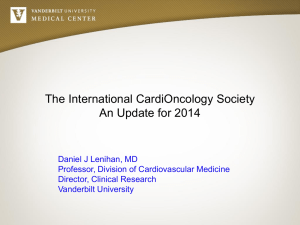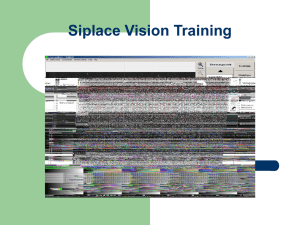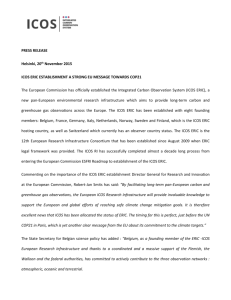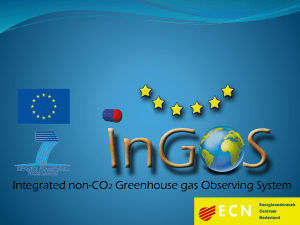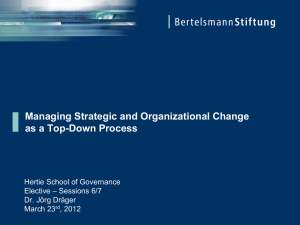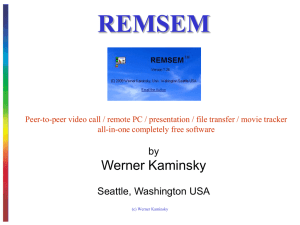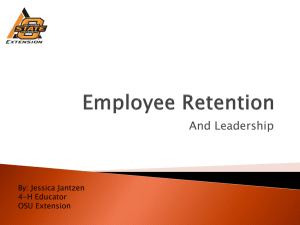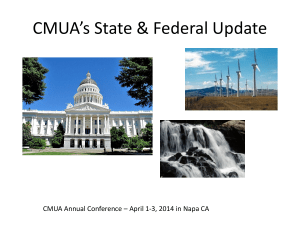ICOS - Group on Earth Observations
advertisement
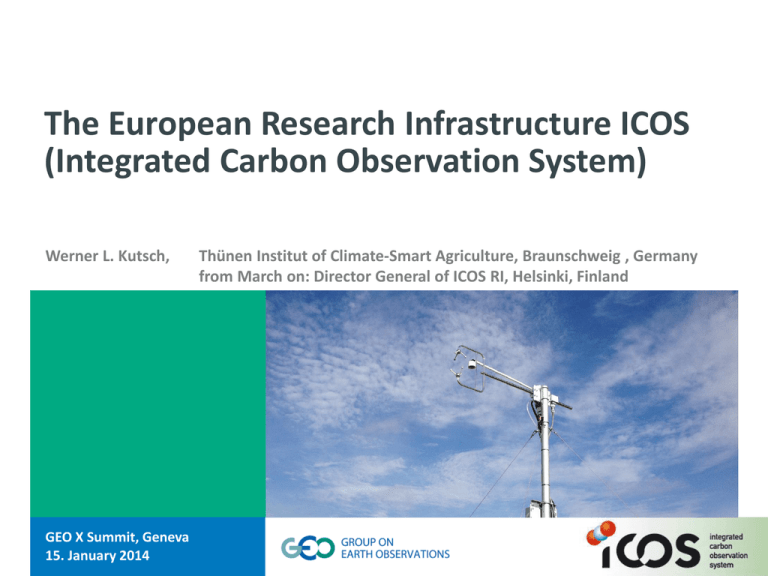
The European Research Infrastructure ICOS (Integrated Carbon Observation System) Werner L. Kutsch, Thünen Institut of Climate-Smart Agriculture, Braunschweig , Germany from March on: Director General of ICOS RI, Helsinki, Finland GEO X Summit, Geneva Werner L. Kutsch 15. January 2014 Introduction and background Climate changes caused by the increase of greenhouse gases represent a major challenge to mankind. Precise, long-term and internationally comparable measurements are a key factor in improving our knowledge of the complex interactions between climate on the one hand and biosphere, hydrosphere and atmosphere on the other. They are the best investment for avoiding surprises and reducing uncertainties about what tomorrow holds. ICOS will provide these measurements. Seite 2 15. Jan 2014 Werner L. Kutsch The vision and the scientific mission of ICOS • fundamental understanding of carbon cycle, greenhouse gas budgets and pertubations and underlying processes, • ability to predict future changes, • verify the effectiveness of policies aiming to reduce greenhouse gas emissions, • technical and scientific innovation, • education and capacity building. Seite 3 15. Jan 2014 Werner L. Kutsch The vision of ICOS All important parameters State of the art techniques Representative networks Relevant data products Optimum data streams Long-term financial security of all partners A community to produce higher level output Seite 4 15. Jan 2014 Werner L. Kutsch The ICOS station network today ….and anticipated ICOS station network 2020 Seite 5 15. Jan 2014 Werner L. Kutsch ICOS atmospheric stations and inverse modelling of CO2 fluxes ICOS 23 stations Europe ICOS 50 stations Europe Kadygrov et al. EGU 2013 Uncertainty reduction on CO2 fluxes during the month of July 2007 red = CO2 flux is better constrained [courtesy J.D. Paris] Seite 6 15. Jan 2014 Werner L. Kutsch Carbon observations Aircraft: Vertical sampling High accuracy Multispecies Ground based remote sensing: Permanent monitoring Good accuracy Satellite calibration Satellite remote sensing: Vertical column, Global coverage Poor - good accuracy Masts, Tall towers: Permanent monitoring High accuracy Multispecies FTIR IAGOS TCCON CONTRAIL Eddy covariance: “Direct” measurement of local fluxes ICOS NEON Seite 7 15. Jan 2014 Werner L. Kutsch GOSAT OCO-2 MERLIN (CH4) … ICOS NOAA/GMD [courtesy J.D. Paris] Development of ICOS R&D, design studies ICOS ERIC 2014 European Research Infrastructure Consortium 2001-2008 CarboEurope-IP, CarboOcean-IP Other research projects National networks Preparatory phase (EC-FP7) 2008-2013 EU funding Transition phase Construction phase 2011-2016 National contributions Operational phase 2015-… [courtesy J.D. Paris] Werner L. Kutsch National contributions + EU funding The structure of ICOS RI ICOS council ICOS ERIC Greenhouse gas flux assessments International programs Head office Data from connex projects and international networks Carbon Portal Global Networks GEOSS Analytical Laboratory Ecosystem Thematic Centre Atmospheric Thematic Centre Ocean Thematic Centre Calibration Sample Analysis Ecosystem stations Atmospheric stations Quality Control Training Sensors developed Ocean Ships and stations Ocean component into ICOS under design Seite 9 15. Jan 2014 Werner L. Kutsch European Level The structure of ICOS (Germany as example) Director General Headoffice 7 6 6 2 5 6 Eco ETC MSA Carbon Portal 1 2 3 2 1 Oce OTC MSA 3 RI Committee 6 General Assembly 6 2 1 6 6 National Level 3 Atm ATC MSA Lab user assembly 6 4 ? CRL 8 BMBF 11 Information Coordination Model application National Competence Centre 8 Wissensch. 8 Versammlung 9 9 9 BMVBS CAL 10 Lenkungsausschuss (LA) Wissensch. Beirat 10 BMELV BMU Werner L. Kutsch Public Other Users; Other Funding Organisations Data Administration Money Verification of policies to reduce GHG emissions Sources: IPCC; Peters et al. 2012a; Le Quéré et al. 2012; CDIAC Data; Global Carbon Project 2012 Seite 11 15. Jan 2014 Werner L. Kutsch Verification of policies to reduce GHG emissions Post-Kyoto agreement (2020) Develop observing techniques Establish baselines Critical Verification Period Robust verification, fine grid Initial capability, ERIC (2014) Fully operational (2020) Future enhancements (2030…) Seite 12 15. Jan 2014 Werner L. Kutsch ICOS and GEO (the good news) ICOS will provide long-term and highly accurate data on atmospheric GHG concentrations, GHG fluxes between ecosystems and the atmosphere, and between oceans and the atmosphere and, thus, will contribute to a Global Carbon Observation System ICOS data policy: in general open access and free. ICOS contributes to the Open E-Science Information Linking Model ICOS understands itself as a contribution to GEOSS. The ICOS community is very keen to develop higher level products on European and Global GHG fluxes together with other partners in GEO (e.g. remote sensing community) Seite 13 15. Jan 2014 Werner L. Kutsch ICOS and GEO: an example http://www.genesi-dec.eu/search/ Ensuring interoperability through GEOSS data infrastructure will optimize the discoverability, accessibility and re-use of data GENESI-DEC discovery platform Here: collocating ICOS and SCIAMACHY data [courtesy J.D. Paris] Seite 14 15. Jan 2014 Werner L. Kutsch ICOS contributions to GEO Automatic, robust, timely in-situ GHG data provision by ICOS to atmosphere and land services in Copernicus Contribute to achievement of Task CL-02 Global Carbon Observation and Analysis: • Infrastructure (better data and enhanced interoperability) • Science and technology (link with space) • User engagement (network design, requirements) • Contribute to the WMO Global Atmospheric Watch (GAW) GEOSS Common Infrastructure: Enable brokerage solutions for ICOS data Submit data to WMO WDCGG -> GEOSS Data CORE Seite 15 15. Jan 2014 Werner L. Kutsch EC: an integrated C-contribution to GEO ICOS contributions to GEO Past FP5/FP6, CARBOEUROPE cluster, CarboAfrica, CarboOcean, others: Experience put in place and/or enhance the EU carbon monitoring system; improved knowledge of the European (and African) C-cycle. FP7, COCOS: coordinated European and global carbon relevant Strategy initiatives; defined the GEO C-Strategy. FP7, ICOS Prep Phase: set up the infrastructure for a integrated and Infrastructure standardized monitoring of C-cycle at global level, starting from Europe. FP7, GEOCARBON: global coordination toward the design and Coordination development of an Operational Global Integrated Carbon Observation and Analysis System. Future Seite 16 15. Jan 2014 Operation Werner L. Kutsch ICOS and GEO: gaps ICOS Carbon Portal is under construction (will become operational 2014). ICOS has started internal and external discussions about: • Metadata • Digital object identifiers (doi) for data • Data citation systems But there is no final conclusion yet. We are open to discussions on standards. Seite 17 15. Jan 2014 Werner L. Kutsch ICOS and GEO Thank you! werner.kutsch@ti.bund.de www.icos-infrastructure.eu nadine.schneider@lsce.ipsl.fr jdparis@lsce.ipsl.fr www.icos-inwire.lsce.ipsl.fr Seite 18 15. Jan 2014 Werner L. Kutsch
